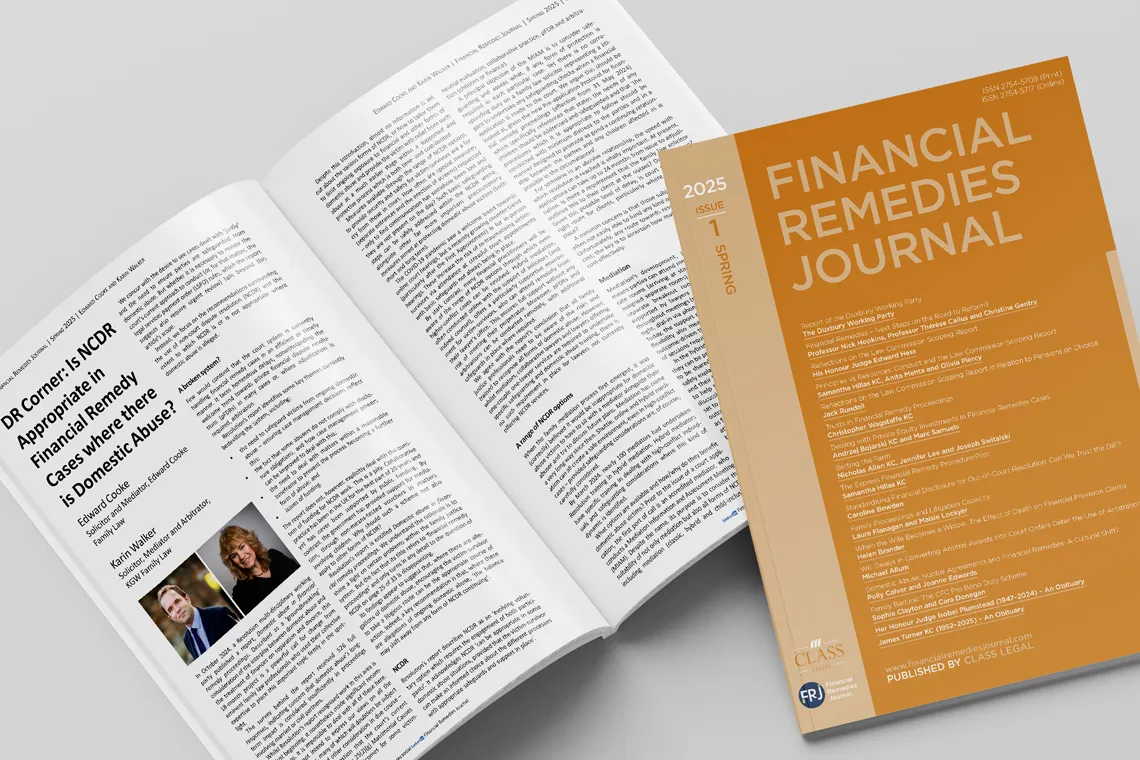Edward Cooke collaborates with Karin Walker on a thought-provoking article in Financial Remedies Journal Spring 2025 edition
28 March 2025

Edward Cooke collaborated with fellow practitioner Karin Walker on a discussion piece in the Financial Remedies Journal Spring 2025 edition, exploring the appropriateness of non-court dispute resolution (NCDR) in cases where domestic abuse is alleged.
The Financial Remedies Journal is a termly journal, published by Class Legal which “promotes serious and high-level debate and thought about the workings of the world of Financial Remedies, both substantively and procedurally, and inside and outside of court.”
In the article, Edward and Karin refer to Resolution's October 2024 report, Domestic abuse in financial remedy proceedings, and its important role in bringing the interplay between domestic abuse and the treatment of finances on separation and divorce into the spotlight.
The pair make clear, though, that their task within the piece was not to express their views on all the recommendations arising from that report. Instead, the article explores in focus the recommendations surrounding the use of non-court dispute resolution (NCDR) and the extent to which NCDR is or is not appropriate where domestic abuse is alleged.
Edward and Karin underscore the need for safeguarding victim-survivors from ongoing domestic abuse and the risk of traumatisation, whilst ensuring fair outcomes as they explore the potential benefits of NCDR in these circumstances.
Areas covered within the article include:
- Reflections on the impact of the broken court system.
- The range of NCDR options, including hybrid mediation, arbitration and private financial dispute resolution (Private FDRs).
- The development of mediation practice in the post-pandemic landscape.
- Addressing the concerns about NCDR where domestic abuse is a factor.
- Recognising the time and cost effectiveness of NCDR approaches and the possibility of mitigating re-traumatisation of victim-survivors.
- Considering training requirements to support the way forward.
In the piece, Edward and Karin conclude:
“In the new post-April 2024 environment, court proceedings are no longer to be issued without proper consideration of NCDR, and then only as a last resort. Indeed, even where domestic abuse is present, there are almost certainly better routes and options to be properly explored first. Where domestic abuse is concerned, the court process will lead to further delay which may cause re-traumatisation. It is no magic bullet.
For individuals who stubbornly refuse to meaningfully participate in any form of NCDR, court may be unavoidable. However, given developments in recent months, there is now an expectation that some form of NCDR is properly explored first.”
Edward commented:
“Karin and I, as experienced family solicitors and mediators, felt this was an important issue to explore. In addition to her mediation work, Karin is also an arbitrator and co-led my hybrid-mediation training, so we have a long shared history around this work.
Reflecting on the evolution of family law and my own practice, I understand the concerns some have about using NCDR in cases involving domestic abuse. Just five or ten years ago, I, too, would have concluded that the potential risks outweighed the benefits. However, much has changed in the way we conduct NCDR, influenced in part by a post-pandemic world, where video conferencing has become an accepted and familiar forum for many for both work and personal matters.
More importantly, modern approaches to resolving family disputes - such as hybrid mediation, shuttle mediation and online mediation - are now central to our practice. In the right circumstances, these methods offer opportunities to safeguard those most at risk during separation and divorce. This enables us to practice very safely, when we consider it possible to explore things in this less adversarial way, instead of proceeding straight to court.
Additional safeguards, such as the use of Independent Domestic Abuse Advisors, can be integrated into the process. We always present options in a clear and balanced way, ensuring clients feel fully supported and in control throughout.
Of course, court remains necessary in some cases. As skilled practitioners, our role is to assess each situation individually and recommend NCDR only when it is both safe and beneficial for all parties.
Karin and I hope this article sparks discussion and provides valuable insights into the best ways to support individuals as they move forward with their lives.”
You can read the full article from page 88, here.


